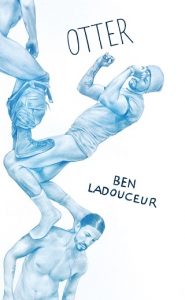 Ben Ladouceur, 80pgs, Coach House Books, chbooks.com, $17.95
Ben Ladouceur, 80pgs, Coach House Books, chbooks.com, $17.95
If you didn’t know, gay men often use the names of woodland creatures (bears, cubs, etc) to describe men’s relative body hair and shape, ‘cause why not? For the uninitiated: an otter is a leaner, younger guy with a furry face or body. And probably relatively hip, to boot.
But although “otter” is contemporary lingo, Ben Ladouceur’s thusly-titled collection isn’t so concerned with inhabiting the present. More often, it revives and reviews a particular gay history. Figures like Vaslav Nijinsky, Oscar Wilde, Wilfred Owen and all of their respective lovers are deployed as a means of unpacking the poet’s own environments, sex life, and general sense of doubt.
Yes, a backwards nostalgia for his literary inheritance pulses through Ladouceur’s collection, and his language is decidedly aristocratic: “our bodies shall devise unpunctuated treaties,” he imagines a beautiful, vacant woman whispering in “Fête”. “How I refused to don the clothes the maid ironed,” says the voice of another poem, set in 1922.
Otter is formally impressive, with clever cadences, playful, sometimes obscure word choices, and tightly coded confessional vignettes — which is perhaps why it feels so stuffy. Ladouceur loosens up and settles into the collection’s title in the third and final section, “Dead Dreams of Monochrome Men,” named after a 1990 dance piece by Lloyd Newson. This last batch is verbally sparser, more modern. His bourgeois aesthetic revamps somewhat for today, decorated with things like assless briefs, penile cysts, Band-Aids and corduroys. Ottawa and Toronto’s streets, malls, and gay bars provide the backdrop for a less guarded intimacy that simultaneously plays out in emails and “that photograph everyone liked”.
Ladouceur is smart with words, perhaps consumed by them, and sometimes it feels like he’s trying too hard. But then again, that’s what we so often ask of poets. And at his best, his delicate wordplay becomes a sieve clarifying his insights rather than masking them. (Jonathan Valelly)
